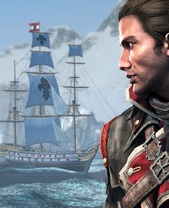
Since Assassin’s Creed: Unity has been dominating gaming headlines all week, we’ve decided instead to focus on the lesser known of Ubisoft’s latest two releases. Assassin’s Creed: Rogue is exclusive to last-gen systems and serves as a ‘sort-of sequel’ to Assassin’s Creed IV: Black Flag, mostly taking place chronologically after the events of that game and some years before the events of Assassin’s Creed III. Rogue therefore sees the return of many features and characters of the series thus far, such as the pirate-turned-Assassin Adéwalé as well as Templar Grand Master Haytham Kenway.
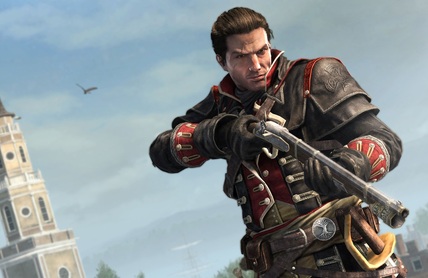
Finally bringing a conclusion to Ubisoft’s American quartet (which also includes Liberation and Black Flag) the game sees us mainly inhabit the role of Shay Patrick Cormac, a puckish, Irish Assassin who goes ‘rogue’ after an explosive disagreement with his brotherhood in North America. Shay then joins up with the colonial Templars during the Seven Years War in order to restore a sense of pride and balance to himself, as well as to the colonies (although more specifically the areas of New York, the North Atlantic Ocean and the Riverlands), as both the Assassins and Templars prepare for the inevitable American Revolution. The storyline features a look at the Assassin Order from a fairly different perspective than usual, helping to further emphasise that the feud between the Assassins and the Templars is anything but black and white. As Assassin’s Creed III made quite clear there have been heroes and villains on both sides of the centuries-old conflict.
It has to be said that Shay himself is not an immediately likeable protagonist from the offset though. It’s largely because of an odd voice acting choice for the most part (as some of his dialogue sounds as though it has been written for someone slightly chirpier), although the character certainly grows on you as his story further develops.
Whilst not as agreeable as, say, Edward Kenway, things definitely get a lot more interesting when Shay leaves the Assassins and starts a life as an associate of the Templars. As the story unfolds, Shay is presented with the very real certainty that he will end up murdering his former Assassin comrades somewhere down the line, whereas by contrast Edward’s story was one fueled by total allegiance to his pirate friends. Edward was also only ever provoked into killing people and never strayed into hapless murder, whereas Shay holds no such boundaries. As a Templar, Shay does not have to worry about holding his blade – and the Animus won’t punish you for murdering citizens anymore (a first in the series). The only consequence of this to watch out for, should you choose this path, are bounty hunters who will be alerted to your position on the map. This presents the Assassin’s Creed series the title with the most amount of freedom so far.
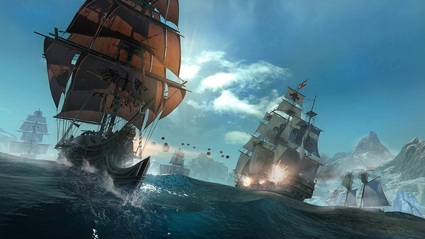
With regards to those entries in the series, Rogue also sees the return of several mechanics which were introduced to the series and then left out of Black Flag – such as the building renovation and the banking systems (taken from the Ezio trilogy), which have now been combined with the naval elements of the later games, allowing you to form an empire of wealth across the region. The naval fleet mini-game from Black Flag returns as well, further allowing you to generate more coin for yourself. This can become quite addictive after a while if you want to unlock certain weapons and items, and encourages you to go out and add more ships to your fleet (as certain missions can only be passed with a number of Man o' War vessels.) The gang activities from Revelations make a comeback as well, only this time you will have to dethrone Assassin gang leaders instead of Templar generals in order to conquer a specific area of the map. This applies to both the cities and the larger naval maps, mixing together the territory battles from both games. The system has been nicely reworked so that instead of running away once they sense your presence, the Assassin will direct their guards from a high vantage point in order to root you out as an attacker. You will have to overcome certain obstacles, such as blowing up their weapon supplies and burning their flag as well as killing the lead Assassin, before you can claim the area. Once the area is claimed, as with the previous games, you can then renovate structures (such as shops, banks and local monuments) and complete activities.
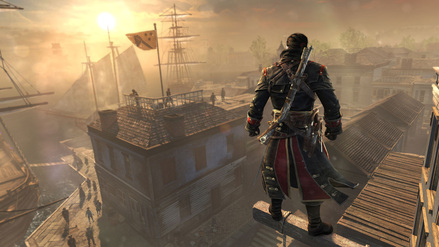
Back to the gameplay, the accumulation of money in Rogue is what allows you to upgrade your ship, buy more powerful weapons and keep your ammunition topped up (which I always forget to do.) Other items are more specialist and can either be found hidden in the world somewhere or can be crafted. Whilst finding specialist items (such as certain types of clothing or weapons) can be purely cosmetic, they can also serve to heighten your defence and abilities.
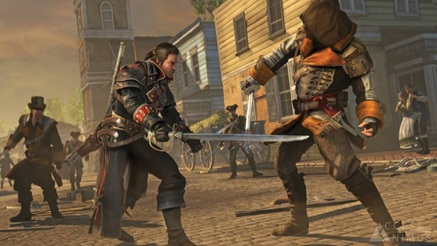
As Shay spends the majority of the game as a Templar, you will encounter enemy Assassins throughout the world. The game alerts you to their presence through ‘whispers’ (similar to the distract noise which features in Middle-Earth: Shadow of Mordor), a sign to activate your Eagle Vision and search for your attacker’s hiding place. This blends elements of the multiplayer aspects found in previous games, with that specific section in the final act of Black Flag where you (as Edward) must weed out your attackers from their hiding places before they can strike. Whilst the combat generally remains unchanged from the previous game, several new weapon additions have been included, such as the air rifle (Shay’s equivalent of the blowpipe) and grenade launcher (...Yes, you read that correctly.) Whilst hunting down the Assassins can be very satisfying, especially since they're out to get you, as a cosmetic choice I would have preferred that they were dressed more like the typical Assassins of the previous games. Most of the ones I killed looked just like normal NPC's, which makes sense from the standpoint of someone who doesn't want to be detected, but since you can use Eagle Vision to see where they are makes the effort of pretending to be a normal NPC futile. Also, in the trailers and marketing for the game all of the Assassins are wearing their traditional garbs. False promises, Ubisoft! The new weapon choices, although specifically the grenade launcher, make a lot of the boss villains very easy to overcome. It also breaks the immersion when you blow an enemy Assassin to bits, and then have to watch a cut scene with Shay kneeling beside them (with the Assassin bearing a curious stab wound).
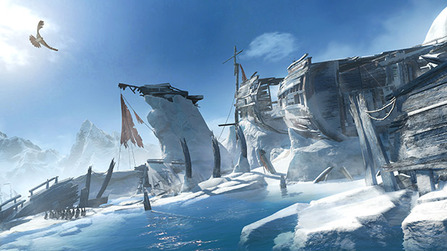
The weather system has also been updated to accommodate snowy effects, and ships can now be struck by lightning. The naval combat and exploration mechanics have been fully fleshed out and now allow for your new ship, the Morrigan, to navigate the maps more quickly and fluidly than before. It seems strange to me that the infamous sea shanties have made a return (some of which have been carried over from Black Flag) when the tone of the game's story, and of Shay's personal journey, seem to render them unnecessary. The less-tropical setting too make the shanties feel somewhat out of place compared to when sailing around the West Indies. But speaking of which, the Morrigan is faster and much more efficient than the Jackdaw. Shanties aside, a whole new arsenal has been added on top of old favourites, and the enemy A.I. has been given a bit of a boost to even things out. If the Morrigan is rammed by an enemy brig for instance, you can now be boarded and will have to defend your crew and ship from being destroyed on the main deck, adding a new challenge to your seafaring days. You are also encouraged to approach naval battles with more tact than in Black Flag, as you can use the icy environment to your advantage. For instance, you can now fire at nearby icebergs in order to trigger large waves and quickly overwhelm your attackers with the elements as well as your mortar.
In terms of gameplay, Rogue is more of a sidestep than a step forward. But the developers never promised for it to be the bold leap of faith that Unity was meant for. That said, it is certainly a rewarding plathrough for experienced fans of the series and offers so much replay value. Even if series' newcomers can't wrap their head around the typical convoluted Assassin's Creed plot, at least they'll be spoilt for choice in terms of activities and exploration. The game is filled with so much to do outside of the main quest that you'll find, even after you've completed the storyline, that you have barely explored the rest of the world. As a fan of the series I would recommend this title but only to those who have already played and completed Black Flag. I would also offer a suggestion to Ubisoft about the direction of this particular story arc that, should they wish to continue making games for the 360 and PS3 by reusing assets of previous titles (which, let's face it, has been in every game except Unity), that perhaps exploring the time period of the Napoleonic Wars would be an interesting new setting, and would also allow them to continue the timeline of the American saga but in a different part of the world.
Assassin's Creed: Rogue was not a game Ubisoft were obligated to make since Unity was their focus, but I for one am glad that they did.
'I make my own luck.'

Did you buy either Rogue or Unity this November? What did you think? Let us know in the comments below!

 RSS Feed
RSS Feed
